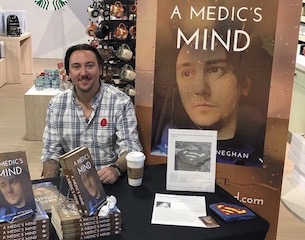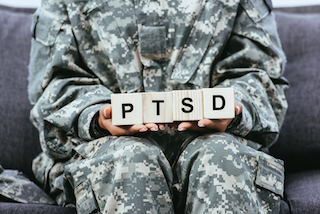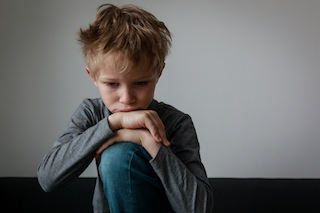January 31, 2024
by Elizabeth Pratt

People remember moments immediately after a distressing episode with more clarity than the moment preceding the distressing event.
Research investigating memory and trauma published in Cognition and Emotion could help inform the approach to treating PTSD, assist clinicians in combating memory loss in Alzheimer’s and even improve evaluation of eyewitness testimonies.
[More]
March 30, 2023
by Elizabeth Pratt

People with PTSD or are at high risk of PTSD have specific patterns in four types of biomarkers that can be measured through a blood test.
The research suggests the biomarkers could be used as a tool to predict whether a person is likely to develop PTSD, as well as help diagnose the condition and monitor how effectively someone is responding to treatment.
[More]
December 29, 2022
by Elizabeth Pratt

35% of children injured with a firearm receive a new mental health diagnosis in the year following their injury.
Data published recently in the Anals of Surgery found that child survivors of firearm injury have high rates of new mental health diagnoses, even when compared with children who have injuries in motor vehicle accidents.
[More]
July 31, 2021
by Elizabeth Pratt

Nearly half of staff working in the intensive care unit during COVID-19 show signs of mental health conditions.
A study from Imperial College London found that 48 percent of healthcare staff showed signs of depression, insomnia and post-traumatic stress disorder.
[More]
February 9, 2021
by Patricia Tomasi

A new study published in the American Journal of Psychiatry looked at repeated Ketamine administration for chronic post-traumatic stress disorder (PTSD). “This study was the first randomized controlled trial to examine the efficacy of repeated ketamine infusions in improving PTSD symptoms in individuals suffering with chronic PTSD,” study author Adriana Feder told us.
[More]
May 19, 2020
by Patricia Tomasi

Post traumatic stress disorder (PTSD) affects eight per cent of adults in the United States. That means eight million Americans suffer from PTSD annually. Women are more likely to suffer from PTSD than men. While 10 per cent of women develop PTSD at some point in their lives, four per cent of men will experience PTSD. One of the responses to PTSD is anger as well as depression, chronic pain, sleep problems, substance misuse, suicide, and grief. A new study published in the Journal of Neuroscience examined the link between traumatic stress and aggression.
[More]
November 12, 2019
by Patricia Tomasi

For Matthew Heneghan, author of the newly released memoir, A Medic’s Mind, writing became a way of letting the poison out. “I was not gifted with a natural ability to write,” Heneghan told us. “I merely endured the experiences required to give my soul the time it needed to learn how to cry. What you see on paper or page are not letters and phrases from me...they’re tear drops.”
[More]
July 30, 2019
by Patricia Tomasi

“The neuroendocrine system, which produces cortisol, plays a significant role in stress responses,” study author Dr. Yang Li told us. “When stress occurs, cortisol is released and fights off stress. Oxytocin can help the cortisol levels return to the normal level. If these two hormones work well and interact well, women will be more likely to be resilient when traumatic events happen. Otherwise, if these two hormones do not function well and interact well, women will be more likely to develop PTSD after exposure to traumatic stress events. Childhood trauma is the root of problem, as it causes damage to the two stress-related systems.”
[More]
June 26, 2019
by Elizabeth Pratt

Researchers have found that soldiers who were deployed in Afghanistan experienced greater symptoms of PTSD being a witness to another's suffering, then when personally being in danger themselves.
[More]
May 28, 2019
by Patricia Tomasi

A new study from the University of East Anglia, published in the Journal of Psychology and Psychiatry looked at how common post-traumatic stress disorder (PTSD) is in children and adolescents in the initial weeks and months following a trauma. “Why do some young people show no clinically significant PTSD symptoms early on,” study lead researcher, Dr. Richard Meiser-Stedman told us, “while others show a significant reaction?”
[More]